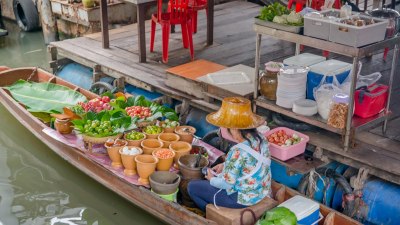Why You Should Visit a Floating Market on Your Next Trip
Explore the unique experience of visiting a floating market on your travels.

When planning your next trip, it's essential to consider unique cultural experiences that can enhance your journey. One such experience is visiting a floating market, where you can immerse yourself in the vibrant local life, savor exotic flavors, and enjoy picturesque views.
Floating markets are bustling hubs, often found in Southeast Asia, particularly in countries like Thailand, Vietnam, and Indonesia. These markets were originally designed for trading goods via rivers and canals, making them an integral part of local commerce. Over time, they have evolved into popular tourist attractions, offering a glimpse into traditional lifestyles and the chance to buy local products.
Rich Cultural Experience
Visiting a floating market provides an insight into the local culture and traditions of the area. You can observe the daily routines of local vendors as they operate their rowing boats loaded with fresh produce, handcrafted goods, and delicious street food. Engaging with the sellers can lead to interesting conversations and stories, allowing travelers to connect on a personal level with the community.
The atmosphere at these markets is often lively and chaotic, filled with the sounds of laughter, haggling, and chatter. This environment can be exhilarating, making you feel part of something distinctive and alive. You may find that markets display everything from colorful fruits and vegetables to handmade crafts, reflecting the artistry and culinary habits of the region.
Delectable Food Options
One of the biggest draws of visiting a floating market is the food. Each market has its own specialties that you can sample right from the source. Whether it's coconut pancakes, spicy noodles, fresh fruits, or sweet treats, the options are endless. You can taste dishes that might be hard to find elsewhere, prepared by locals who have honed their recipes over generations.
At a floating market, many vendors cook on boats, serving steaming bowls of noodle soup or sizzling stir-fries right in front of you. Eating at the market provides not only a culinary adventure but also a chance to witness the cooking techniques and local ingredients used in these traditional recipes. Enhancing your experience with local flavors creates lasting memories of your travels.
Scenic Views and Unique Vistas
Floating markets are often situated along picturesque waterways, surrounded by lush landscapes and vibrant local architecture. As you navigate the market, you’ll be captivated by the beautiful scenery. The shimmering water, bustling boats, and vibrant market stalls make for incredible photo opportunities.
Many floating markets are located near scenic spots like temples or traditional houses. Some markets operate at sunrise, providing you with breathtaking views as the sun rises over the water. This extraordinary backdrop transforms your visit into a delightful experience that combines shopping, culture, and nature.
Support Local Economies
By buying handmade crafts, local delicacies, and fresh produce, you also engage with the heart of the community and promote sustainable tourism. It creates a ripple effect that helps ensure the survival of unique traditions and practices that define the culture of the region.
Eco-Friendly Travel
Many floating markets operate on waterways, embodying eco-friendly principles by utilizing the natural resources around them. This form of commerce encourages the use of boats which minimizes pollution compared to land markets. Traveling to these markets often involves boats powered by human paddling or small engines, keeping the environment at the forefront of the experience.
Furthermore, local vendors often sell organic products and sustainable goods, contributing to eco-friendly practices. If you are a conscious traveler, visiting a floating market aligns with a desire to engage with communities in a way that respects and preserves the environment.
Unique Souvenirs and Handcrafted Goods
Floating markets are fantastic places to shop for unique souvenirs and handcrafted goods that reflect the culture of the area. You can find items such as handwoven textiles, artisanal pottery, and captivating local artwork that tell the stories of the region and its people.
Unlike mass-produced items commonly found in tourist shops, the products from floating markets often carry an authenticity that reflects the craftsmanship and creativity of local artisans. Choosing to bring home these unique keepsakes adds a personal touch to your travel story.
Make Lasting Connections
Interacting with local vendors provides the opportunity to make memorable connections during your travels. These interactions can lead to lasting friendships, enriching your understanding of the culture. Many vendors enjoy engaging with visitors and sharing the story behind their products.
The cultural exchange that occurs at floating markets can lead to unexpected friendships and networking opportunities while traveling. You may discover other attractions you may not have known about or find recommendations for hidden gems in the area. Exploring a floating market can open up new paths for adventure and exploration.
Family-Friendly Activities
Floating markets are suitable for travelers of all ages, making them family-friendly locations. Children are often drawn to the colorful sights, delicious smells, and the excitement of being on the water. Parents can introduce their kids to local cuisine, allowing them to try new flavors and foods in a fun and engaging environment.
Many markets also hold activities such as boat rides and local performances, adding an element of entertainment for the young ones. Experiencing the local culture as a family creates memories that everyone will cherish for years to come.
Tips for Visiting Floating Markets
1. Choose the Right Market: Research floating markets ahead of time to find one that aligns with your interests. Some markets are more touristy, while others retain authenticity and cultural significance.
2. Visit Early or Late: To avoid the crowds and enjoy a more tranquil experience, consider visiting during early morning hours or just before closing. This also allows you to enjoy the cooler temperatures.
3. Bring Cash: Many local vendors may not accept credit cards, so make sure to bring cash in local currency for purchases.
4. Dress Comfortably: Wear lightweight and breathable clothing, as you’ll be spending time outdoors. Also, consider wearing waterproof shoes as your feet may get wet.
5. Understand Local Customs: Be respectful of local customs and practices. Engage with vendors politely and appreciate the cultural significance of the market.
In summary, visiting a floating market should be an essential part of your travel itinerary. The combination of rich culture, delectable food, unique scenery, and opportunities to support local economies makes it an experience unlike any other. Whether you find yourself sampling local delicacies, snapping photos of the scenic views, or haggling for handcrafted items, the memories you create at a floating market will last a lifetime.
So, on your next trip, make sure to seek out a floating market – for a truly immersive adventure that will enhance your travel experience and introduce you to the heart of the culture you are exploring.











